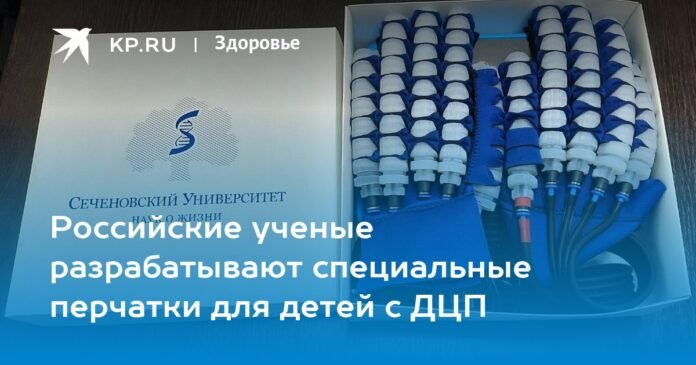Photo from the press service of Sechenov University.
Scientists from Sechenov University of the Russian Ministry of Health have developed a glove-shaped device with five silicone mechanisms (actuators) to help people after strokes or serious injuries. This device helps restore finger motor skills when mobility is weakened or affected.
Usually, mobility is restored with the help of constant exercises, massage and physiotherapy, but it is not always possible to work with a specialist. Also, in case of serious injuries or serious injuries after a stroke, mobility can be so impaired that the person simply cannot cope with the necessary exercises.
The device, developed by specialists from the Controlled Bionic Systems Laboratory, is a glove with special mechanisms (actuators) on the top of the fingers. Under the influence of compressed air from the compressor, they change shape and help bend the fingers.
“Thanks to the special shape of the actuator, under air pressure it bends, also bending the fingers, as if someone put their hand on top of the patient’s,” explains Alexey Maksimkin, head of Sechenov’s controlled bionic systems laboratory. University student, candidate of physical and mathematical sciences. – When the air supply is stopped, the pressure decreases. The pressure, as well as the flexion frequency, can be adjusted according to the doctor’s recommendations. For example, if individual fingers are affected, only those fingers can be bent.
Yes, these devices already exist, but so far they have not been produced in Russia. In addition, analogues are made of more rigid materials.
Scientists from Sechenov University used soft polymers: they are lighter and more comfortable for the patient. And the softness of the polymers makes the effect more subtle. Such a device will help the user develop muscle memory by repeating a certain set of movements over and over again.
Recently, Sechenov University donated a batch of these gloves to the Grossko Scientific and Practical Center for Physical Rehabilitation and Children’s Sports. The center helps children with various movement disorders. And the training of hand motor skills is one of the important aspects necessary for the further development of the child.
– The hands are the main instrument of touch; Their physical development and the ability to control movements are extremely important. And for this we want to use gloves created by scientists from Sechenov University,” said Grossko director Nina Gross. – We have already used another development by specialists from the laboratory of controlled bionic systems: a polymer pneumatic gripper that is used as a simulator to develop the compression movement of the hand. By squeezing the bulb, the child pumps air into a soft manipulator, similar to the faucet on a toy catcher, and uses it to move small objects.
The center’s employees will periodically conduct hand motor tests before and after training with the glove, analyze the results and transmit them to the developers. And scientists, in turn, will be able to understand how to adapt the device’s operating algorithms to young children. Now the invention is suitable for adults and teenagers, but children cannot use it yet.
“We are working on several design options that could be used for very young children,” says Alexey Maksimkin. – The sooner treatment for neurological diseases begins, the greater the patient’s chances of recovery. It is important that our rehabilitation device can be used at any age.

